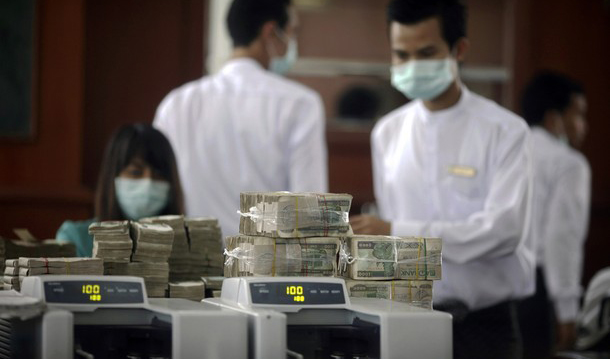Burma Investors Pin Hopes on Seminal Sunday

The clamor to enter Burma's emerging markets has received yet another boost with the announcement that the national currency will be floated on Sunday—the same day as seminal by-elections.
The April 1 ballot is seen as the ultimate litmus test before punitive Western sanctions can be lifted, and now another major barrier will disappear with the deregulation of the kyat opening the way for international commerce.
The official rate is currently pegged at kyat 6.4 to the US dollar, which is 125 times higher than the more realistic black market rate of 800 kyat. This discrepancy gives massive room for graft with accounting done at the official rate, and commodities such as natural gas sold abroad at the realistic rate—the difference being pocketed by regime cronies.
Increasing the transparency of doing business in Burma is seen as a major hurdle, even if there remains a sense of trepidation amongst potential investors.
“Every day, another delegation, another delegation, another delegation, and no one’s putting money on the table,” Tony Picon, associate director of property broker Colliers International Thailand, told Bloomberg news agency on Wednesday.
“The business community that’s visiting Myanmar must be honest and say ‘We’re just looking, we’re not going to buy,’ and not leading to a false sense of anticipation from the local community,” he said.
Even so, representatives from a raft of industries are currently looking to exploit Burma's abundant natural resources, cheap labor and enviable geographical position between the markets of India, China and Southeast Asia.
And sweeping new laws— including tax breaks of up to five years, the right to lease real estate from the state or private hands for up to 30 years, allowing 100 percent repatriation of profits, and the right to distribute products locally—are expected to be passed by the Burmese Parliament in the coming months.
Nobody denies the immense opportunities available in this nation of 64 million people, even if battle-weary financiers are hedging their bets. Jim Rogers, the chairman of Rogers Holdings, said last month that he would invest all his capital in Burma if he could.
Although Burma's financial system remains primitive by modern standards—its first ATMs have just been installed, credit card facilities are sparse, and the antiquated two-tier exchange rate mechanism is still in place—all these barriers are posed to come tumbling down in a matter of weeks.
Mike Smith, the chief executive of Australian banking giant ANZ, is watching the diplomatic thaw in the hope that the resource-rich country will be a key aspect of his aggressive expansion plans into Asia with new branches throughout the region.
“We can't do anything until the Australian government lifts its restrictions [on Burma] but hopefully that will be a positive. I would like to have a presence there too,” he told The Australian on Monday.
British banking giant Standard Chartered has already expressed interest in entering the Burmese market.
“We make 70 percent of our income in Asia, and Myanmar is one of the very few countries where we don't have a presence,” Napas Paorohitya, senior executive vice-president for corporate affairs, told The Irrawaddy earlier this month.
“We would look at any market in our footprint where we don't have a presence and are able to operate, but only open for business in a market when it is safe and makes economic sense to do so.”
Than Lwin, the deputy chairman of Burma's largest commercial bank KBZ, said last week that the Myanmar Central Bank will likely cut interest rates which remain higher then its neighbors—currently standing at eight percent for deposits and 13 percent for lending.
Naypyidaw is also likely to allow foreign banks into the country by 2015 and give the central bank greater independence in setting rates, Than Lwin told an investment seminar in Bangkok.
“If there is any doubt, you can rest assured that this time around we are really changing. There is political will from the government,” he said.
KBZ Bank is reportedly expanding its branch network and looking to install a Swift system of money transfer so they can deal effectively with foreign firms.
1 | 2 next page »
|
||
|
||
|
||
|
||
|
||
|
||
- 'My Wife Died From Police Abuse,' Says Husband
- US Says Observer Conditions Don't Meet Int'l Standards
- 159 Observers to Monitor Burma Election
- Govt to Address Breaches of SSA-South Ceasefire: Aung Min
- Malaysia PM Leads 50-Strong Delegation to Burma
- US Congress to Assess Burma's Political Prisoner Issue
- Rangoon Woman in Police Station Death Plunge
- Burmese Legal System Remains Tool of Govt: AHRC
- Burmese Army Chief Defends Political Role
- NLD Seeks Election Talks with KIO
